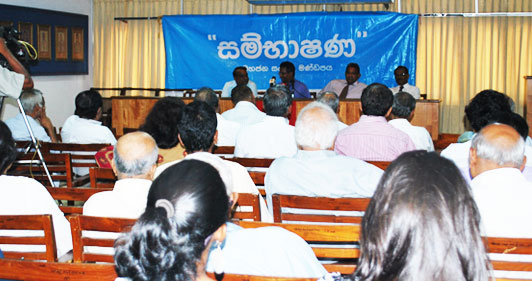Although elections are an integral part in a democracy, in Sri Lanka elections are imposed on people every year, whether they like it or not, spending billions of Rupees of tax payers’ money, alleged election monitoring heads at the panel discussion organized by Transparency International Sri Lanka (TISL and held in the auditorium of Organization of Professional Associations (OPA) on 11th February 2014.
While questioning the justification for wasting billions of rupees on an election system that is flawed, they alleged that massive misuse of public property has become a common occurrence.
Rohana Hettiarachchi executive director- PAFFERAL, Dr. Paikiyasothi Saravanamuttu executive director -CPA and S. Ranugge executive director – TISL were the panelists at the discussion. ‘The theme of the discussion was ‘Elections and the role of the Public’. Attorney at law J.C. Weliamuna was the moderator.
“In the electoral system, there are three important things on the voters’ side to be taken into account: Registration, voters’ responsibility electing responsible persons as their representatives and monitoring the functioning of their elected body after the election. But most of them do not take informed decisions when selecting the candidates and they do not value monitoring of the elected body after the election’ said the panelists.
It is also the responsibility of the voters to elect right type of people to represent and take part in the governance. They must get a firm commitment from them what they are planning to do once they get elected. Popularity/financial strength of a person itself is no qualification, they stressed.
Every legitimate voter must ensure that their name is registered, obtain a receipt after submitting their registration forms and must also ensure that their names duly entered and registered in the voters’ list, Rohana Hettiarachchi pointed out.
Political parties are required to send their agents to accompany the Grama Niladaris when registration forms are issued to every house. Although political parties do appoint agents, only a very few take part in the process, he said.
He added that the police, on numerous occasions, have shown their partiality toward the incumbent ruling party. Abuse of state property is quite common which must be resisted by the people. It is also the responsibility of the Election Commissioner to blacklist those public servants who indulge in campaign activities.
Speaking on behalf of TISL , executive director S. Ranugge said that after the election, citizens fail to monitor their representatives’ participation in the decision making process and their electoral duties. They neither make use of the opportunity accorded to them to observe sittings of local governing bodies and the actual participation of their elected representatives.
One of the panel members pointed out that it was sad to note the a sitting of UVA PS has ended in just three minutes. From June to December 2011, fourteen sittings had been postponed due to lack of quorum or lack of proposals to debate. A particular member of the same PS has attended only one sitting during this period.
“At least Rs. 100,000/- is spent on one sitting for meals and other businesses of a local body. There are 330 Pradesheeya Sabhas and 9 Provincial Councils in the country; the situation in Parliament is no better, rarely one could see more than 10-15 members in the chamber at a time. You could count and say the number of members who have not spoken a word in Parliament so far. Is this the type of people we select as our representatives” the panelists asked.
“It is not sufficient to make only the Commissioner of Elections independent. The Public Services Commission and the Police Commission too should be independent. If the police act impartially during an election no one is there to prevent the consequences after the election. Further, the OIC is appointed on the recommendation of the organizer of the party which hold power. In this background, expecting an OIC to act impartially is a myth. Any of these cannot be taken in isolation; they are connected with the system itself. There must revision in the electoral system, legislature and the executive.
“Only people can bring about these changes. Rather than waiting for others to do it for us, let us do what we can.”
13 Feb 2014

